
views
X
Research source
Not Looking Creepy
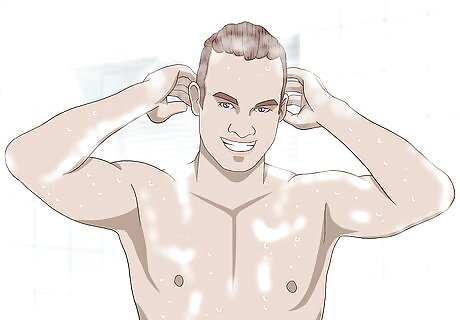
Practice good hygiene. Although it isn't always true that dangerous people look disheveled, it is an extremely common stereotype. For this reason, it's very important that you always look neat and well-groomed. Wash your hair regularly and get it cut often so that it looks neat. Always wear clean clothes. Bathe every day to avoid smelling bad. You should also wear deodorant, and cologne/body spray/perfume if you'd like.
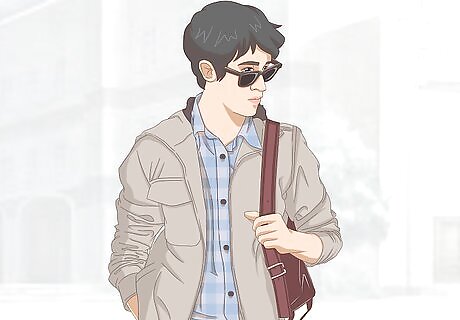
Look your best. People generally find attractive people less creepy than unattractive people. While you should not go to great lengths to change your appearance just to satisfy other people, you may want to consider taking some small steps to make yourself more attractive. People tend to find under-eye bags creepy. If you have these, there are a variety of ways to minimize their appearance, including reducing your alcohol and sodium intake, treating your seasonal allergies, sleeping on your back, removing your makeup before bed, using sunscreen, quitting smoking, and applying a cool compress to your eyes. Bulging eyes are also generally considered creepy. If you're a woman, try applying dark eye shadow to your lids and curling your eyelashes to help them appear less bulging.

Dress well. The way you dress is the aspect of your appearance that you have the most control over. Because people tend to associate anything out of the ordinary with creepiness, try to keep your clothing neutral and on-trend. Steer clear of clothing that doesn't match or doesn't fit you well. It's also best to avoid anything that looks like it should be worn as part of a costume, like a cape. Don't wear clothing with slogans that promote violence or dehumanize women, as this may make people think you are potentially violent, and thus creepy. There's nothing wrong with wearing clothes that express your personality, but if you're really concerned about other people thinking you're creepy, be careful about wearing anything too unique. If you're unsure whether an outfit will make you look creepy, try asking a trusted friend or relative what they think. You don't need to be extremely fashion-forward to not look creepy. A simple pair of jeans and a t-shirt is usually a safe choice.
Interacting With Others Without Being Creepy
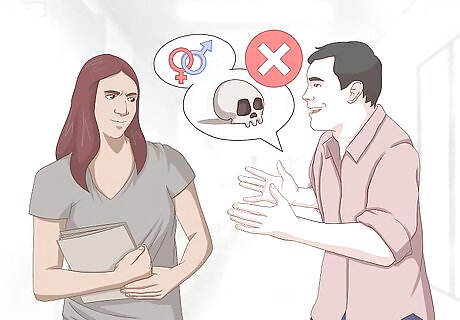
Avoid talking about things that others find disturbing. People typically find it creepy when others talk about morbid topics, especially for extended periods of time. It's best to avoid these topics altogether, unless you are sure that the person you are talking about will be interested. Some topics to avoid include death, torture, and sexual fetishes. People tend to assume that individuals whose professions or hobbies involve death are creepy, so if you enjoy taxidermy or work as a mortician, you may want to avoid bringing these topics up with new acquaintances. If it comes up, you can laugh and acknowledge "It's a little creepy!", and then talk about a more cheerful topic. There are also some less obvious topics that many people find weird. The best example is clowns, which give lots of people the creeps. While talking about sex is not always creepy, talking about it constantly or at inappropriate times definitely is. If you're ever unsure whether it is appropriate, avoid bringing it up.
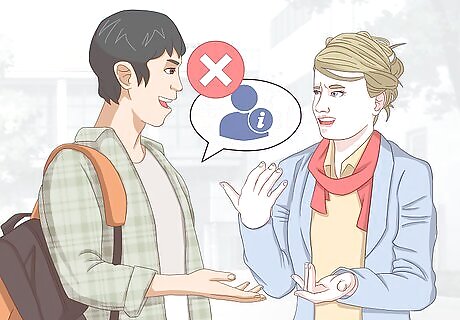
Don't ask overly personal questions. Getting too personal too fast will definitely make you seem creepy. It's important to respect people's privacy, especially if you don't know them well. For example, asking someone how much money they make is typically considered rude. Asking a more obscure question, like what blood type the person is, is just plain creepy because you have no need to know that information. Even if you know someone well, be careful about asking obtrusive or rude questions. If you ever want to ask something but you're not sure if it's appropriate, consider prefacing the question by saying something like, "I'm sorry if this is a weird question" or "Forgive me for asking." You can also say afterwards, "You don't have to answer that if it's too personal."
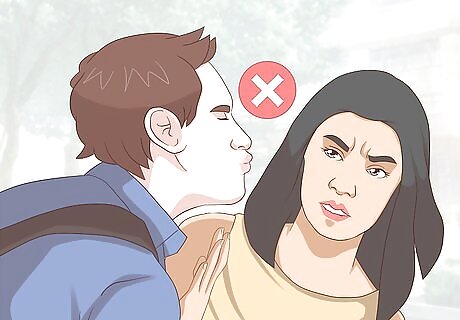
Avoid making abrupt sexual advances. Most people do not appreciate uninvited sexual advances. To avoid being seen as a creep, it's best to avoid advancing on someone you've just met. If you are really interested in the person, try getting to know them first instead of just trying to pick them up. Men are much more likely to be considered creepy when they make uninvited sexual advances on women than vice versa. In fact, women tend to think that "creepy" men pose some kind of sexual threat, and may be afraid of them. Compliments are okay, but try not to go overboard. If you have just met a person, try only offering one compliment instead of several. You can decrease your chances of the compliment being interpreted as creepy if you avoid staring at the person before offering it and if you try talking to the person and getting to know each other a bit first. Also, try to make compliments more general, such as, "I like your shirt!" or "Hey, where'd you get that phone case? It's nice." Don't say stuff like, "Your eyes are beautiful." or "You smell good."
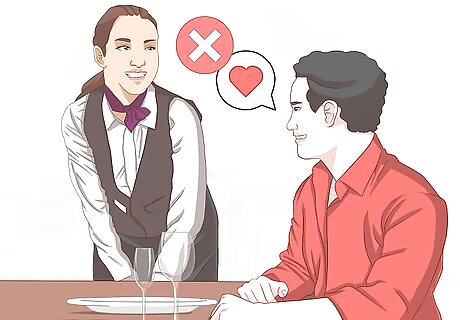
Recognize when it is inappropriate to flirt. When people are at work, busy, or "trapped" (e.g. working a shift at a coffee shop), it is not the right time to flirt. Don't catcall; this is creepy and misogynistic. Don't assume that a friendly waiter or barista is flirting. Their job requires them to be polite, and they are "trapped" because they need to work and stay polite. If you absolutely want to date them, leave your phone number with the check, so there is no pressure. Do not flirt with people who are much younger than you. If you are an adult, don't flirt with minors, no matter how "mature" they look or act. Ray Asher Ray Asher, Dating Coach Flirting is an art that requires practice and patience. It's not about being creepy or sleazy, but rather about being confident, playful, and respectful. When you approach a woman with the intention of flirting, remember to be genuine and authentic.
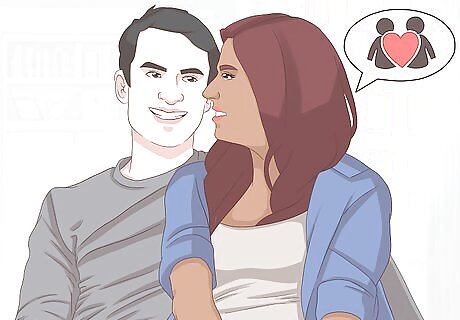
Notice how the other person responds to flirting. If they are interested (open body language, genuinely smiling or laughing, touching you, etc.), then you can continue flirting. If they show signs of discomfort (closed-off body language, looking away, plastered-on smile, fake laugh, avoiding eye contact, frowning), then they are not interested. Apologize for making them uncomfortable, and stop. Flirting with someone who clearly doesn't like it is one of the fastest ways to be seen as creepy. Some people are shy. If they are smiling, then gently proceed. If they look upset, stop right away. Start small. Talk to them, flirt, and see how they respond. Then amp it up if you are getting a positive response. Sending an unsolicited photo of your genitals to a stranger is the exact opposite of what you want to do. Some dating guides tell people (usually men flirting with women) to push the other person's boundaries. This is bad advice, and may scare them and get you pepper sprayed. Always respect someone else's comfort level.
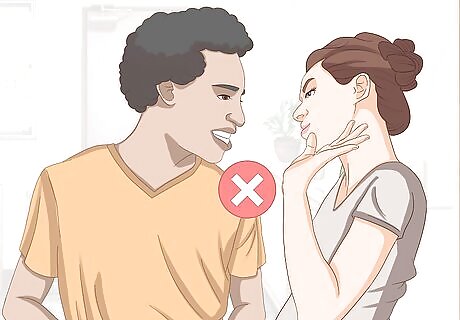
Listen to and respect boundaries. If someone says something like "I need alone time," "Don't touch me," or "Go away," stop right away. This is a mark of good manners and shows that you are non-threatening. Non-creepy people know how to take "no" for an answer. If someone looks like they want to leave a conversation, give them an opportunity to do so. Trying to make them stay can make you seem creepy. Some people, especially women, disabled people, and abuse survivors, may be afraid to express boundaries. Pay attention to their body language. If they're uncomfortable, it might be good to give them some space.

Curb feelings of entitlement. Dispel the notion that you deserve a girlfriend, or that you are owed sex. Recognize that potential partners are people, not rewards earned by being a "nice guy." Work on becoming a better listener, accepting rejection, and respecting the other person's thoughts and feelings. Responding with anger or disrespect when someone won't date you is a hallmark of creeps. Potential dates are not your enemies. If you have to fight them in order to get to them, you're doing it wrong, and it's time to quit. If someone turns you down, it isn't a black mark against you. Maybe you aren't their type, they're too busy for a relationship, or their sexual orientation is incompatible. It doesn't mean that there's anything wrong with you, or that the universe is out to get you. It hurts, but you shouldn't let it define you!
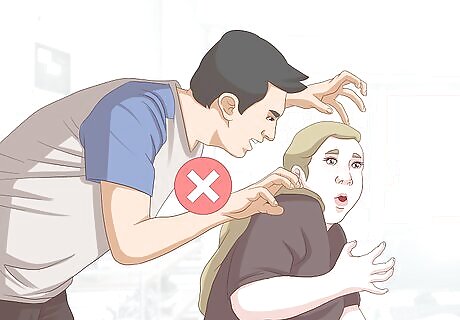
Avoid startling others. Unpredictability is a hallmark of creepiness, so do your best to act in a normal and expected way. People will not want to be around you if they are never sure how you will behave. Avoid jumping out at people or trying to surprise them, unless you know the person and are doing it as a joke. Avoid sudden outbursts, especially if they could be interpreted as violent. If you feel an outburst coming on, say "I need some air" and leave to cool off. Always try to gauge the appropriateness of your behavior by assessing the atmosphere and watching how others are behaving. For example, if you are giving a formal presentation, you would be expected to stand up straight and look at the crowd, so people might find it creepy if you were sitting down and looking at the floor.
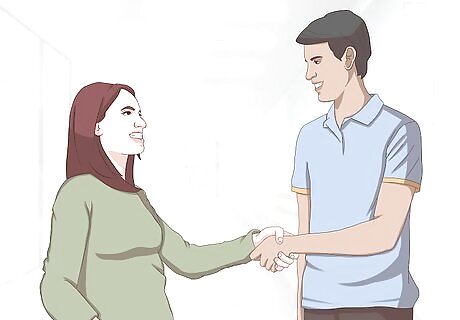
Don't hide your true intentions. Masking your agenda can make you come off as creepy to others. Do your best to be open and honest about your intentions, and be assertive instead of passive-aggressive. For example, a guy who pretends he just wants to be friends with a girl, and suddenly tells her that he likes her, may startle her and make her uncertain how to act. This guy would be better off flirting with her, continuing the flirtation if she responded well, and then explaining his feelings. This way, she is not caught by surprise, and has had time to get used to the idea.
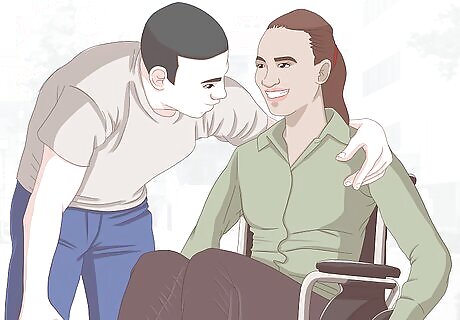
Treat women and minority groups with respect. Racism, sexism, et cetera are often viewed as creepy. Making derogatory comments about groups of people will make them not trust you, and feel unsafe around you. Treating everyone with dignity, without making snap judgments, will help others view you positively. Don't talk down to others (including women and disabled people), and don't use nicknames like "sweetie" or shortened names (e.g. calling a woman "Jessie" when everyone calls her Jessica) Save them for people you are close with, if they like it. Avoid stereotypes such as "that's women's work," "Muslims are violent," or "bisexuals are cheaters." Work on being open-minded and accepting of others, and challenge any negative stereotypes. Know basic manners around disabled people. Respect their personal space, offer help before jumping in, don't ask about their abilities to feed/clean/toilet/have sex,and treat them like adults (unless they are literal children).
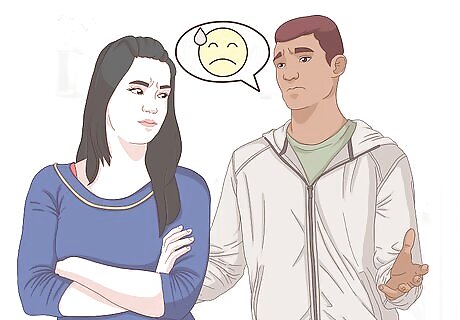
Take responsibility for your actions. Honest mistakes do happen, and you may accidentally creep someone out. If this is the case, you can improve their opinion of you by acting like a mature, upstanding person. Take direct responsibility and apologize. Instead of saying "I'm sorry, but...." say "I'm sorry, and..." This makes it clearer that you aren't trying to make an excuse, just offer an explanation, without diminishing any harm done. For example, "I'm sorry if I made you uncomfortable by complimenting your dress. I thought it was a nice dress, and my intent was to make your day a little better, not to make you uncomfortable. But clearly, that's not what happened, and I'm very sorry. Can we start over?"
Avoiding Creepy Body Language
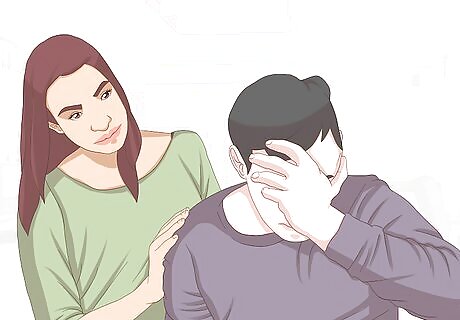
Show your emotions. Your facial expressions are just as important as the words you use when communicating with people. When these deviate from what is considered normal, they can cause people to feel uncomfortable. Do your best to express genuine emotions in your facial expressions. The reason that many people find masks creepy is that they obscure facial expressions. If your facial expressions don't seem appropriate to other people, they will have the same reaction as they would to an expressionless mask. If you feel that you are not able to show emotions with your facial expressions, pay close attention to the way that others look in specific situations and try to mimic their facial expressions. Practice in front of a mirror if you need to.
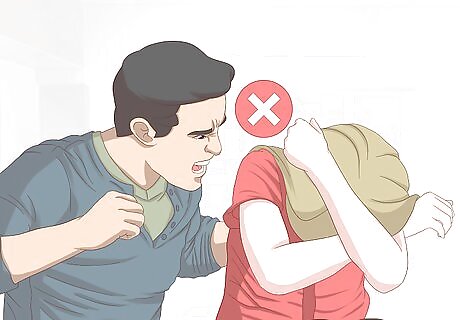
Avoid violent gestures. Creepy people tend to incite a vague fear of physical violence in other people, so you should do your best to make sure you do not give off this impression. Never make any gesture that could be interpreted as violent, even if you are just kidding. Examples of violent gestures include pointing your finger at someone (including yourself) as if it were a gun, cracking your knuckles while staring at someone, or pretending to slit your throat with your finger. There are many others as well, so always take a moment to think about how other people might perceive you before you make any gesture. Shouting at people may also make them worry that you will turn violent. Keep your volume moderate, even when you are upset.

Don't stare at people. People often get uncomfortable when others stare at them, and they may worry that the staring person has sinister intentions. To avoid being seen as a creep, don't stare at people for extended periods of time, whether you know them or not. Taking unwanted photographs is just as creepy as staring, if not more so. Asking for permission does not reduce the creepiness at all. On the flip side, people may also find it creepy if you don't make eye contact while talking to them, so it's important to find a healthy balance. If you have a disability that makes eye contact hard (e.g. autism), look at their forehead, eyebrows, nose, or chin. This is close enough. If you tend to get lost in thought, stare in a direction where there aren't people. This way, they won't think that you're staring at them.
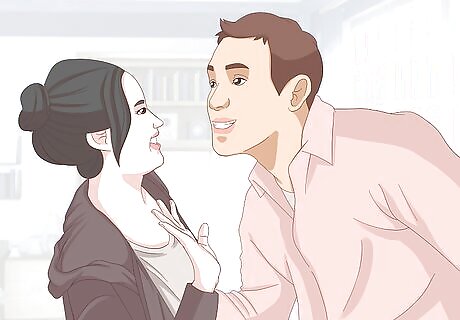
Respect people's personal space. A lot of people will get creeped out if you touch them while having a conversation or stand unnecessarily close to them. Help people feel more comfortable around you by giving them a little space. You do not need to touch someone in an inappropriate way in order for it to be perceived as creepy. Even an innocent touch can seem strange, especially if you do not know the person well. When you're talking to someone, avoid cornering them and making them feel claustrophobic. If you're going to touch someone, let them see it coming, so they aren't startled. This way, they can also decline if they don't want to be touched.














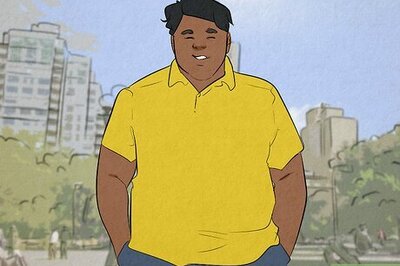

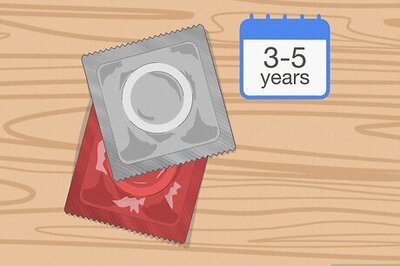

Comments
0 comment